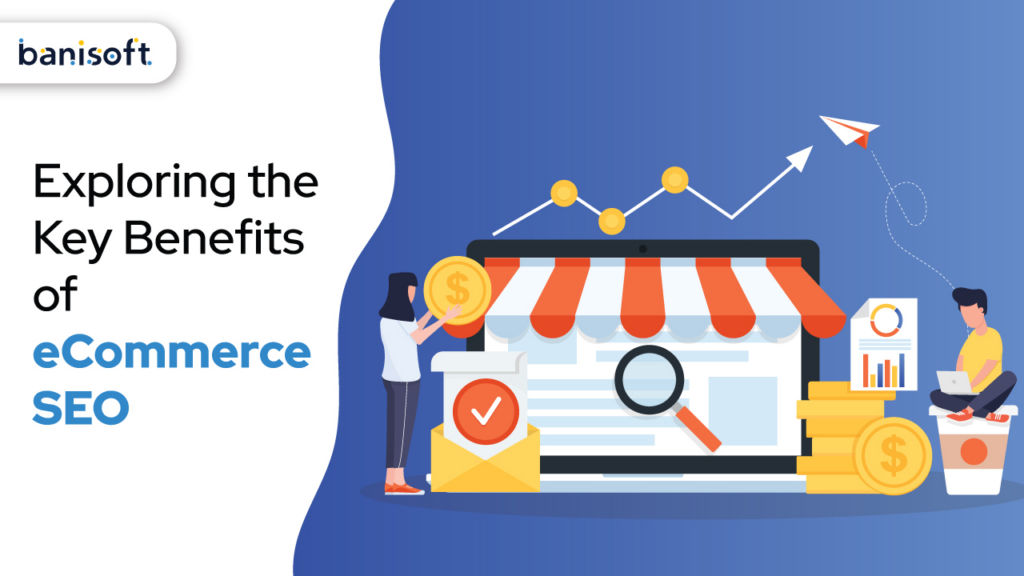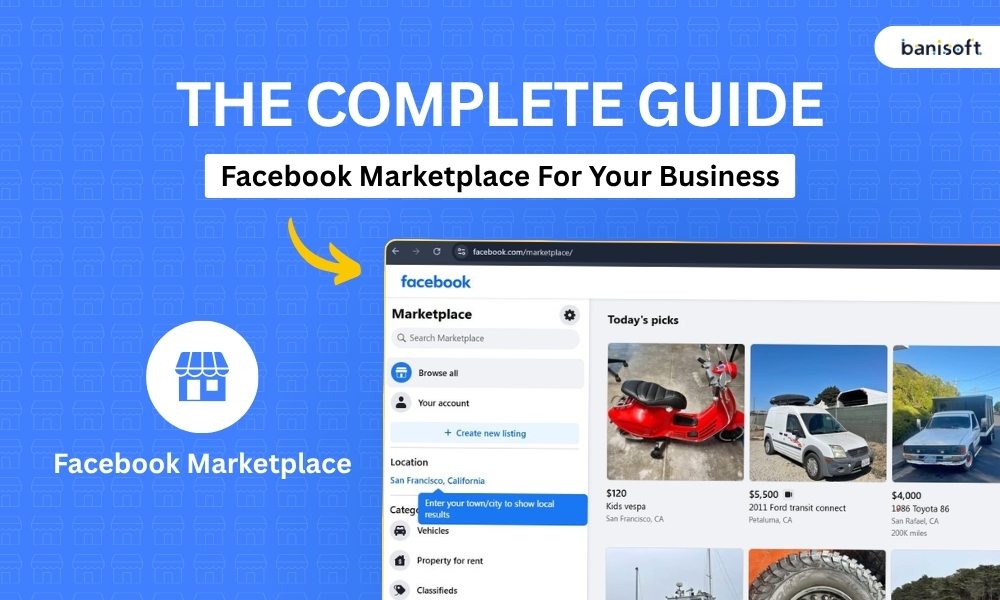
In today’s digital age, e-commerce reigns supreme. But with countless online stores vying for customer attention, achieving visibility can feel like an uphill battle.
Enter e-commerce SEO: a strategic approach that empowers your online store to rise above the noise and attract the right customers.
This exploration of the key benefits of e-commerce SEO will unveil how it can transform your online presence, driving traffic, boosting sales, and propelling your brand to new heights
Understanding eCommerce SEO

Ecommerce SEO is all about making your online store more noticeable on search engine results pages (SERPs). When folks search for products you offer, you’d want your store to pop up at the top to attract more visitors.
Key SEO Principles for eCommerce Success
- Keyword Research and On-page SEO: Start by pinpointing keywords that are relevant to what you sell. Aim for keywords with lower competition to target your niche market effectively. Ensure these keywords are woven naturally into your product titles, descriptions, and tags.
- High-Quality, Fresh Content: SEO isn’t just about optimizing product pages with meta titles, descriptions, and keywords. It’s also crucial to regularly publish high-quality content on your site. This prevents your site from being flagged as spam and helps maintain good standing with search engine algorithms, thus improving your rankings.
- Technical SEO: Technical SEO includes actions like boosting website speed through site architecture optimization, image compression, and enabling browser caching.
Additionally, making your site mobile-friendly by using responsive design is key. Regular site audits can help ensure your website adapts smoothly to various screen sizes.
Boosting Organic Traffic and Sales

Getting your site to appear at the top of search engine results can significantly increase brand awareness and drive traffic to your eCommerce site.
That’s why a solid eCommerce SEO strategy is essential for creating a search-engine-friendly website. Good on-page SEO not only helps increase traffic and sales but also ensures a seamless user experience.
Increasing Organic Traffic
eCommerce is a fiercely competitive field, with giants like Amazon and eBay dominating the scene, along with local niche markets ruling their territories.
Implementing effective eCommerce SEO strategies can help your store climb higher on the SERPs, resulting in more organic traffic to your site.
Not convinced? Let’s look at some compelling stats!
- A whopping 90% of searchers haven’t decided on a brand before they start their search.
- At least 43% of all e-commerce traffic originates from Google’s organic search.
- About 23.6% of e-commerce orders are directly tied to organic traffic.
- Over 51% of internet users have discovered a new product or company online.
Enhanced User Experience

Defining User Experience (UX)
User Experience, or UX, is all about how users feel when they interact with a website.
It covers a wide range of factors, including the design of the site, how easy it is to navigate, how quickly pages load, how well it works on mobile devices, how relevant the content is, and overall user satisfaction.
The Link Between UX and SEO for eCommerce Sites
Search engines like Google aim to deliver the best results for users’ queries.
To do this, they look at user signals such as bounce rates, the amount of time visitors spend on a site, and conversion rates to gauge the quality and relevance of a website. eCommerce sites that offer a great user experience often see lower bounce rates, longer visit durations, and higher conversion rates.
These positive signals tell search engines that your site is valuable, which can help it rank higher.
The Perks of a Better User Experience
- Better User Satisfaction: When your website is easy to use, visually appealing, and meets users’ needs, it leaves a good impression, boosting user satisfaction.
- Increased User Loyalty: A great user experience builds customer loyalty. People are more likely to stick with a brand that consistently delivers what they expect, leading to lasting relationships.
- Competitive Edge: In a crowded market, a smooth and enjoyable user journey can set your brand apart from the competition and attract more users.
- Lower Support Costs: A user-friendly website design reduces the chances of user errors and confusion, which means fewer support requests and lower support costs.
- Higher Conversion Rates: A positive user experience can lead to higher conversion rates. Whether users are making a purchase, filling out a form, or signing up for a service, a good experience encourages them to take the desired actions.
- Increased Efficiency and Productivity: Internally, well-designed systems can boost efficiency and productivity. Employees using user-friendly tools can complete tasks more quickly and effectively.
- Informed Decision-Making: By analyzing user experiences, organizations can gain valuable insights into user behavior and preferences. This information supports data-driven decision-making, helping to create products and services that better meet user needs.
- Positive Brand Image: Focusing on UX helps build a positive brand image. Users associate well-designed, user-friendly experiences with a brand that values their needs and respects their time.
Higher Conversion Rates through Targeted SEO

Targeted SEO, or SEO for ecommerce, means optimizing your website to attract specific, relevant, and high-quality organic traffic.
This focused approach aims to increase the chances of turning visitors into customers or clients. Here are effective strategies:
Optimize Content: Craft compelling headlines, descriptions, and meta tags with relevant keywords. Engaging copy and multimedia (like images and videos) can also boost SEO and influence user decisions.
Use Social Media: Platforms such as Facebook, Instagram, and Twitter can drive organic traffic. Share content optimized with keywords to attract more visitors and improve conversion rates.
Improve User Experience: Enhance website navigation, speed, mobile-friendliness, and overall structure. A user-friendly site makes it easier for visitors to find what they need.
Capitalize on Local SEO: For businesses targeting local customers, optimize content and profiles for local searches. Utilize local directories to enhance visibility.
Utilize Quality Links: Building links from reputable sites boosts authority. Focus on relevant sources to improve credibility and SEO ranking.
Cost-Effective Marketing

SEO is highly cost-effective as it targets users actively searching for your products or services online. Unlike outbound strategies like cold-calling, SEO brings inbound traffic that is more likely to convert. Here’s why investing in SEO makes sense:
Long-term Results: SEO builds a sustainable online presence that continues to attract organic traffic long after initial setup.
Higher ROI: By optimizing your website and content, you increase visibility to users actively seeking what you offer. Over time, the cost per customer acquisition tends to decrease compared to paid ads, making SEO a smart investment.
In essence, SEO not only boosts visibility but also attracts qualified traffic, making it a cost-effective strategy for businesses looking to grow online.
Building Brand Awareness and Credibility

How SEO Helps
SEO boosts your website’s visibility on search engines like Google, which enhances brand awareness. The better your ranking, the more likely people will see your site when searching for relevant keywords. Increased visibility leads to more organic traffic, thereby raising brand awareness.
High-ranking sites on Google show authority and relevance for specific keywords.
Achieving a top position on Google’s first page is ideal for businesses wanting to stand out in a competitive market. Being at the top makes your brand more recognizable and memorable.
Additionally, ranking high or as a featured snippet acts as social proof, enhancing your credibility and trustworthiness—key factors in building brand trust.
Conclusion
To sum it all up, eCommerce SEO is a real game-changer for any online business aiming to make a splash in today’s fiercely competitive digital arena.
By fine-tuning your online store for search engines, you’re not only boosting your visibility and attracting more organic traffic but also bolstering your brand’s credibility and trust.
Smart SEO tactics ensure you reach the right audience at the perfect time, which translates to higher conversion rates and increased sales.
Moreover, a well-optimized eCommerce site enhances the user experience, fostering customer loyalty and repeat business.
Investing in eCommerce SEO isn’t merely about staying ahead of the competition—it’s about establishing a strong and adaptable online presence that can keep pace with evolving market trends and consumer behaviors.
Embrace the wonders of SEO and watch your eCommerce business prosper and flourish. Get in touch with our experts today!


